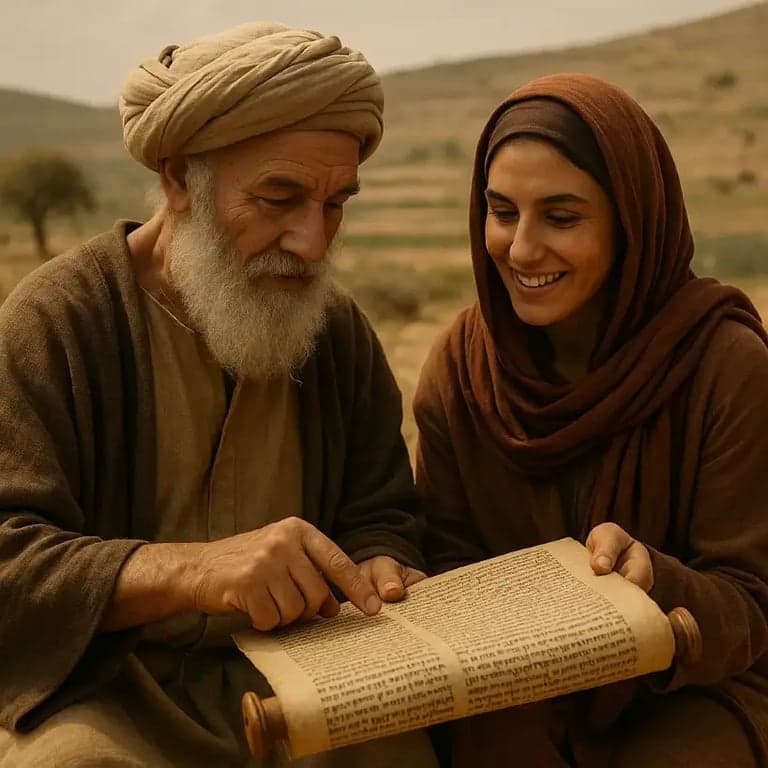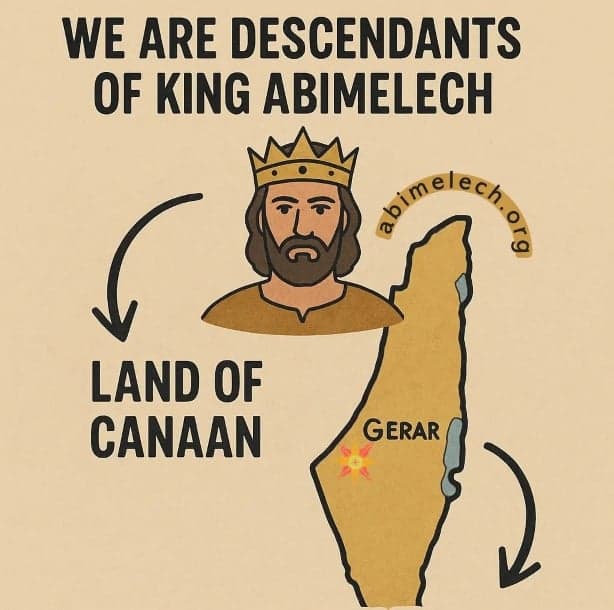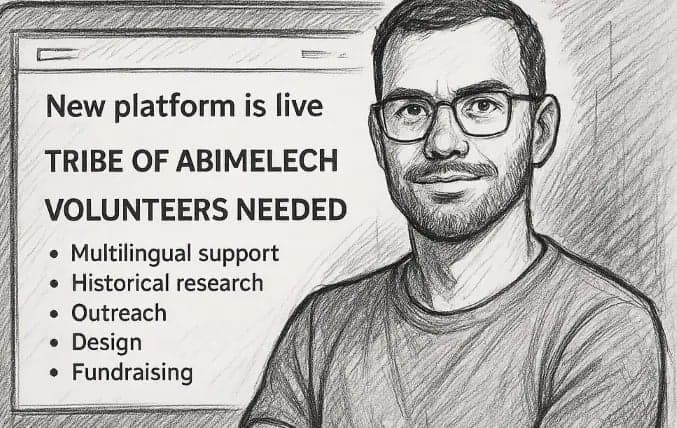 Some projects you pick. Others pick you. This is one of those. Project 33 wasn’t assigned, scoped, or budgeted. It came out of my skin. Out of my bloodline. Out of long conversations I had with my father and the silence that followed him when the world stopped listening. It’s a tribe. It’s a website. It’s a homecoming. It’s called abimelech.org, and it’s live in early beta.
Some projects you pick. Others pick you. This is one of those. Project 33 wasn’t assigned, scoped, or budgeted. It came out of my skin. Out of my bloodline. Out of long conversations I had with my father and the silence that followed him when the world stopped listening. It’s a tribe. It’s a website. It’s a homecoming. It’s called abimelech.org, and it’s live in early beta.
This isn’t like anything I’ve done before. It’s not a client project, not a product launch, not a pitch. It’s personal-but also principled. I’m not here to stir hate or draw lines in anger. I built this with respect, for the sake of memory and healing. I’m still taking on consulting and enterprise architecture work—this project doesn’t pay the bills. But it feeds something else. And maybe, with the right support, it’ll grow into something that does both.
Our Identity: Canaanite. Not Colonial. Not Arab.
This project grew from a need to say something that hasn't been said in the right way. For decades, Palestinian identity has been flattened into a political checkbox. Like we all came from the same place, same time, same story. But the truth goes deeper than slogans or census codes.
Our tribe—the Tribe of Abimelech—comes from before the maps. We descend from Abimelech, son of Canaan, a name that shows up in ancient texts and local memory. Our roots are tied to a man, who married into the hills and left children whose children still walk these lands.
We lived through the Nakba of 1948.
We lived through forced silence and forgotten names.
We’re still here.
Our people have moved between Beersheba, Gaza, Jerusalem and Haifa, and the desert corridors reaching toward modern Jordan in the Valley of Moses. We were here before lines were drawn. We didn’t arrive—we stayed.
We are not Arab immigrants.
We are not colonial constructs.
We are indigenous.
And yet, no matter how deep our roots go, the world has made it easy to forget them. Without a place to hold our story, it was always at risk of being rewritten. This project is my way of refusing that. Of choosing memory over silence, structure over loss.
What I've Built: Technology Meets Ancestry
 Between stone and sky, we rebuild the ties that colonization tried to sever. This is about memory, land, and the quiet power of returning with intention.
Between stone and sky, we rebuild the ties that colonization tried to sever. This is about memory, land, and the quiet power of returning with intention.
I’ve been a Microsoft architect and consultant for years. It paid the bills, kept me building. But I always wanted to build something for us—for the people who had no database, no archive, no system to hold who we were.
So I built it.
After months of design, study, code, and quiet resolve, abimelech.org was born. A home—not just a homepage—for a tribe written out of most systems but alive in blood and memory. Here's what it includes:
🌍 A multilingual website (English, Hebrew, Arabic, and German), built on modern infrastructure.
🧬 A membership system with three paths:
Tribal Member – for those directly descended
Friend – for those who walk with us
Supporter – for those who help us rise
Each of these roles—Member, Friend, Supporter—comes with a purpose, not perks. They represent how people can show up, stay connected, or simply stand with us.
💳 A donation engine, launching the Tribe of Abimelech Launch Fund—our way of planting digital roots to support real-world peace and growth.
🔒 A private dashboard and verification form that values identity, privacy, and dignity. No exploitation. No data games. Just presence.
What started as a website became a vessel. And while I still do tech consulting for a living, this work is about building infrastructure for a people who never had any. What started as my labor now belongs to us.
Why It Matters: Identity Is Not a Luxury
 A new dawn over ancient stones—Project 33 marks not just the return to my roots, but the beginning of something future generations will inherit with pride.
A new dawn over ancient stones—Project 33 marks not just the return to my roots, but the beginning of something future generations will inherit with pride.
Governments get to stamp identities like licenses. But we’ve decided we don’t need approval to exist. We exist because we remember. Because our fathers remembered. Because their fathers never forgot.
This project isn’t just a tech stack. It’s not a novelty.
It’s a platform for reconnection.
It’s a container for intergenerational healing.
It’s a place to say: we’re not waiting for permission anymore.
We’re not asking to be added to anyone’s list.
We’re building our own record.
What Comes Next: Join Us
 At the well of our ancestors, we remember what the world forgot. This is where identity is drawn—not from documents, but from stone, earth, and memory.
At the well of our ancestors, we remember what the world forgot. This is where identity is drawn—not from documents, but from stone, earth, and memory.
The work ahead is deep and generational. That’s why we’re asking for support—not as a handout, but as an act of resistance to erasure, and a commitment to shared survival.
Every generation before us carried this identity in silence or in fragments—whispered names, half-told stories, land remembered only in dreams. What we’re building now is digital infrastructure, and it’s also a lifeline. A way to finally gather what was scattered, to give our children something intact. Not just memory, but presence. Not just grief, but ground.
Ways to help:
Join as a Tribal Member if your family line connects to Abimelech, the Hasanat and Abu Ma'iliq branches
Become a Friend or Supporter if you're moved by the cause
Make one-time contributions through the Launch Fund.
Collaborate—especially on grants, recognition efforts, and cultural documentation
What we’ll use the funds for:
Tribal genealogical research and history documentation
Reunification events to bring separated families together
Legal recognition efforts of our people and tribal territory
A future blockchain-based registry to preserve our records without external control
The goal isn’t to grow fast. It’s to grow real. The site is live in early beta. The pages are working. But what matters most is the spirit behind it. And if this story resonates, I hope you’ll sit with it—not as a pitch, but as a personal offering. It begins with someone I knew better than anyone.
Personal Note
This project is for my father.
For his integrity, his silence, his love for this land and for our people.
It’s for the elders who didn’t have keyboards. And the youth who’ve only known fragmented roots. It’s for those of us who were called by many names, except our own.
Over the years, I’ve lost jobs for telling the truth about my identity. I’ve been challenged in meetings just for naming where I’m from. I’ve been watched, shadowbanned, and excluded. Still, I built this. I built it with code, and with love, and not because I had time; I built it because I ran out of excuses not to. When the doors closed, I carved a path. When the silence got louder, I wrote code. And when the world tried to make me smaller, I made something that could carry all of us.
Final Words
 A name carries everything: bloodline, memory, resilience, geography. My full name is no longer hidden or abbreviated. It’s part of the archive now. Part of the story I am taking back. My full name is: Sousouni Abdel Karim Bajis Abdel Karim Hussain Haj Khalil Sheik Ahmad Miqbel Saqer Hassant - Abimelech. This name carries tribes, places, and stories that no longer appear in most government databases. But you’ll find it now—on abimelech.org. Alongside others who are waking up to who they’ve always been.
A name carries everything: bloodline, memory, resilience, geography. My full name is no longer hidden or abbreviated. It’s part of the archive now. Part of the story I am taking back. My full name is: Sousouni Abdel Karim Bajis Abdel Karim Hussain Haj Khalil Sheik Ahmad Miqbel Saqer Hassant - Abimelech. This name carries tribes, places, and stories that no longer appear in most government databases. But you’ll find it now—on abimelech.org. Alongside others who are waking up to who they’ve always been.
This is Project 33.
It’s a start.
It’s a return.
And it’s open to those who are ready to walk with us.
Let’s make history—not because we want to impress anyone.
But because we already are that history.
If all this name does is remind one person where they came from—or lets one child grow up without needing to erase who they are—then it was worth every line of code, every late night, every door that closed behind me. This isn’t about the past. It’s about claiming the future, in full.





